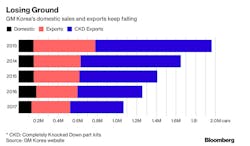After 16 years and billions of dollars in investments, General Motors Co. faces a decision in South Korea: stay or leave.
GM international chief Barry Engle plans to meet South Korean officials this week in a last-ditch effort to salvage a deal for the local unit. Hit by union tensions, shifting customer tastes and mounting losses, GM Korea has an April 20 deadline to submit a turnaround proposal to the government. The unit is seeking concessions from unions as a condition to its plan -- and has threatened to file for bankruptcy if it doesn’t get what it wants.
Chief Executive Officer Mary Barra had no qualms about leaving Europe, India and Russia and has said South Korea gets no special treatment as the carmaker sharpens its focus on profitability. An exit would mean GM ceding one of its major production bases, leaving the company increasingly relying on China for the future of its Asian business.
“Something can’t be a nice-to-do or a good-thing-to-do, but it really has to generate a return,” Barra told investors at a Bank of America Merrill Lynch event in New York on March 28. “Most of you are aware of the significant actions that we’ve taken to exit or restructure lower-return parts of our business over the last number years, and we’re currently very involved in this in South Korea.”
A departure would end GM’s effort to build South Korea into one of its manufacturing powerhouses, a project that began with the purchase of Daewoo Motor Co. assets for $1.2 billion in 2002. After thriving initially -- the unit exported to about 150 countries by 2012 -- it has been hurt in recent years as stiff competition forced GM to withdraw from several major European and Asian markets.
In particular, the division was hit by the Detroit-based automaker’s decisions in 2013 to halt sales of its Chevrolet brand in Europe; to pull back in Russia in 2015; and, last year to stop selling in India. GM built cars in South Korea for the European markets and also produced parts to be sent to emerging countries for assembly, known as completely knocked down kits. Local South Korean sales have also waned amid tough local competition.
Losing Role
The setbacks made GM’s South Korean operations so unprofitable that even its proposed $2.8 billion in new investment and $2.7 billion debt-for-equity swap could prove insufficient to ensure the unit’s revival, said Lee Hang-koo, a senior research fellow at state-run Korea Institute for Industrial Economics & Trade, who has met with GM executives.
“GM Korea has lost its role as an export base and its local sales have collapsed,” said Lee. “GM has said that it would be inevitable for them to follow suit of the Australia case if the cost at the Korea business keeps rising.”
Since she became CEO of the No. 1 U.S. carmaker in 2014, Barra has sold or closed at least 13 plants and walked away from markets boasting more than 20 million in total vehicle sales annually. Even before Barra took over, GM announced the closure of Australian production in 2013.
Union Tensions
In South Korea, the country’s strong labor unions have presented an impediment. Even as orders plunged, contracts with the labor organizations led to rising wages, keeping costs high. The unit accumulated losses of 1.95 trillion won ($1.8 billion) in the three years through 2016, according to regulatory filings.
While tensions with unions have brewed throughout GM Korea’s existence, the relationship grew more sour in recent months, culminating in employees storming the chief executive officer’s offices this month, destroying and removing furniture.
In return for its proposed investments, GM Korea is demanding that unions agree to its cost-reduction plan, and it’s also asking the government to grant its facilities a status that would bring tax benefits.The state-funded Korea Development Bank, which holds a minority stake in GM Korea, has said it may inject fresh funds into the business after assessing its prospects.
“There has to be determination by the two sides so that we can relieve the impact on our stakeholders including customers, suppliers and dealers,” said Park Haeho, a spokesman for GM. “We are committed to carrying out the turnaround plan.”
by Sohee Kim
About the Author
Bloomberg
Licensed content from Bloomberg, copyright 2016.

